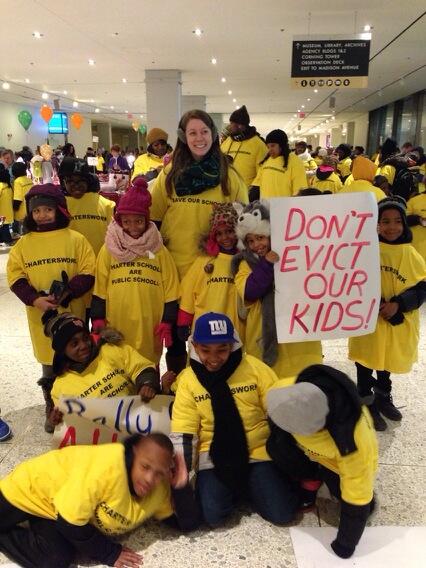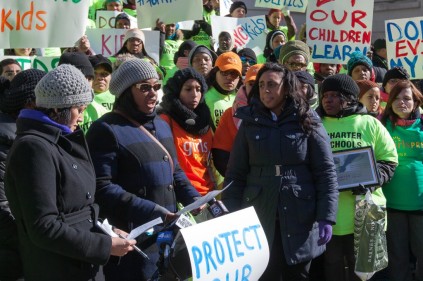It was once said that “all politics is local,” and when it comes to education, it should best be construed as hyper-local: a parent who sends his/her kid to the neighborhood public school does not gives a rat’s arm over what is going on in the next town or the adjoining district. It’s the nature of the beast: as Mel Brooks once quipped, “tragedy is when I cut my finger; comedy is when you fall into an open sewer and die.” In this case, when the school in the poor neighborhood is shut down, re-opens as a charter and displaces hundreds of students, we all shake our heads. When the public school in your neighborhood loses funding for new monkeybars in the playground, we stand in front of the Whole Foods and get shoppers to sign petitions. It’s sad, but that’s the nature of education politics.
Probably the most disturbing images of the charter school battles here in New York is the blatant attempt by the charter demagogues to craft their image as one of the “educational savior.” Surely you’ve seen the photos like the one below, where the children of color are shown as victims of the public school establishment, who were “rescued” by the opening of a charter school.
Even more disturbing are the charter school “photo ops” like the one below which seeks to cast the battles as essentially racial, as opposed to economic. If these were, as Arne Duncan candidly coined them, white suburban moms on the front lines, there would be a much different interpretation of the story.

- Who is standing at the front line of charter school battles?
You have to sympathize with these parents: after listening for years to the incessant fearmongering spread by the likes of Arne Duncan, Michelle Rhee and their cohorts, as well as the ever present problems of the underfunded and humiliated public schools, these parents have found “safe haven” in the charters. They are correct in wanting the best educational opportunities for their children, and they should be applauded for the hard work they have put into advancing their cause. I support their work on behalf of their children, and I would count myself privileged to work in any classroom where their children were present.
At the same time, I hope they recognize that this opportunity is not “free” in any sense of the word. Do they understand that they are the lucky few who made the effort to research these schools, take part in the application process, agree to the rules and regulations that they involve, and take the risk that that their child will most likely not finish in that school eight years later, particularly if he/she is diagnosed with special education needs (where the chances of still being in that charter school 3 years later is an abysmal 20%.)
This is urban-racial-class warfare at its worst: by sorting poor families into the groups of educational “haves” and “have nots,” charters have created the conditions where they divert educational resources to the most “deserving” of children (read: easiest to teach) by systematically creating a new class of parents who want “good schools” for their children. While I’m sure there are not many parents who want to send their kids to a “bad school,” there are many, many parents who don’t know or understand the ins and outs of the educational system to advocate for their children.
Furthermore, there are many who prefer not to send their kids to a charter school, even if it allegedly offers a “superior education”, for a myriad of reasons (although not having your child’s face plastered in a full page ad in the New York Times might have something to do with it.) Some parents may prefer to have a child in a school close to where they live or work, others may prefer to have their child in a school that has a philosophy that is much more aligned to their own, while still others are scared of taking a chance on a charter, given their dismal record working with students who are learning disabled or not yet fluent in English. This is not even to mention the thousands of parents who may be undocumented and do not want to arouse the suspicions of the INS. Still others might find the prospects of an 8 hour school day daunting for their child.
While it would be a great idea if every parent took the time to learn about the educational opportunities available to their children, the sad fact is that the vast majority of parents are overwhelmed by the system. The educational-industrial complex is a vast bureaucracy that has its own thicket of paperwork and hoop jumping. Charters have cut through that thicket by doing something simple: sign on the dotted line, enter the lottery, obey the rules and we promise to give your kids the appearance of a good education; yes, it’s a roll of the dice, but for some desperate families, it is a chance they are willing to take.
So what do we find? Poor and minority families on the front lines advocating as proxies for billionaire benefactors for a separate school system that will systematically drain resources and hurt other poor and minority families who cannot or will not enroll their children in these schools. In effect, the charters ultimate goal is to create a new “educational underclass” composed of the most difficult to teach and the most difficult to reach.
But why should I care about what’s going on in the school across town if my child’s school is doing just fine?
